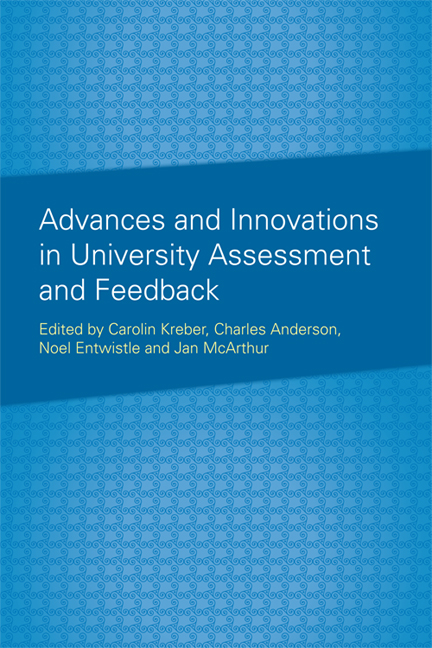Book contents
- Frontmatter
- Contents
- List of Tables and Figures
- Acknowledgements
- Foreword
- Introduction
- Part A Changing Perspectives on the Nature and Purposes of Assessment
- Part B Students' Perceptions of Assessment and Feedback
- 4 Perceptions of Assessment and their Influences on Learning
- 5 Students' and Teachers' Perceptions of Fairness in Assessment
- 6 Perceptions of Assessment Standards and Student Learning
- Part C Reconceptualising Important Facets of Assessment
- Part D Innovations in Assessment Practices
- Notes on the Contributors
- Index
6 - Perceptions of Assessment Standards and Student Learning
from Part B - Students' Perceptions of Assessment and Feedback
Published online by Cambridge University Press: 05 August 2016
- Frontmatter
- Contents
- List of Tables and Figures
- Acknowledgements
- Foreword
- Introduction
- Part A Changing Perspectives on the Nature and Purposes of Assessment
- Part B Students' Perceptions of Assessment and Feedback
- 4 Perceptions of Assessment and their Influences on Learning
- 5 Students' and Teachers' Perceptions of Fairness in Assessment
- 6 Perceptions of Assessment Standards and Student Learning
- Part C Reconceptualising Important Facets of Assessment
- Part D Innovations in Assessment Practices
- Notes on the Contributors
- Index
Summary
Introduction
The relationship between assessment and student learning has been a major issue in education for a long time. The argument has been that what is assessed constitutes the curriculum for many students and how it is assessed constitutes the learning process. The ideas behind, and the relationship between, summative and formative aspects of assessment have been much discussed. More recently, the issue of feedback and its relationship to quality assurance (Williams and Kane 2008) and student learning (Hattie and Timperley 2007) have been at the forefront of these discussions.
Substantial and influential research on assessment and feedback in higher education has been carried out by Dai Hounsell. I first came across Dai's earlier work at a joint conference of the Society for Research into Higher Education and the Cognitive Psychology Section of the British Psychological Society in 1985. At that conference, Dai presented a paper on “Essay Writing and the Quality of Feedback” (Hounsell 1987). Since then, Dai has written extensively on assessment and feedback, recently culminating in a six-step model for feedback (Hounsell et al. 2008). In much of this work, Dai has focused on the processes of feedback and on the criteria of assessment and feedback in relation to those criteria. The quality, quantity, frequency and timeliness of feedback have all been considerations at the forefront of his work, although the issues of standards of assessment, students' understanding of standards and how that understanding relates to the quality of student learning have not been central for him.
In this chapter, I wish to draw upon some of Royce Sadler's ideas of, and, in particular, his focus on, standards and students' understanding of standards of assessment, which complement many of the ideas to which Dai has also referred. I should point out, however, that Royce may not agree with all of the ideas presented here. In his recent work, he has made a strong case that the concepts of ‘criteria’ and ‘standards’ are often confused in the assessment literature in higher education, with criteria often equated with standards; as a result of this, he has made a clear distinction between criteria and standards (Sadler 2005).
- Type
- Chapter
- Information
- Advances and Innovations in University Assessment and Feedback , pp. 114 - 128Publisher: Edinburgh University PressPrint publication year: 2014



